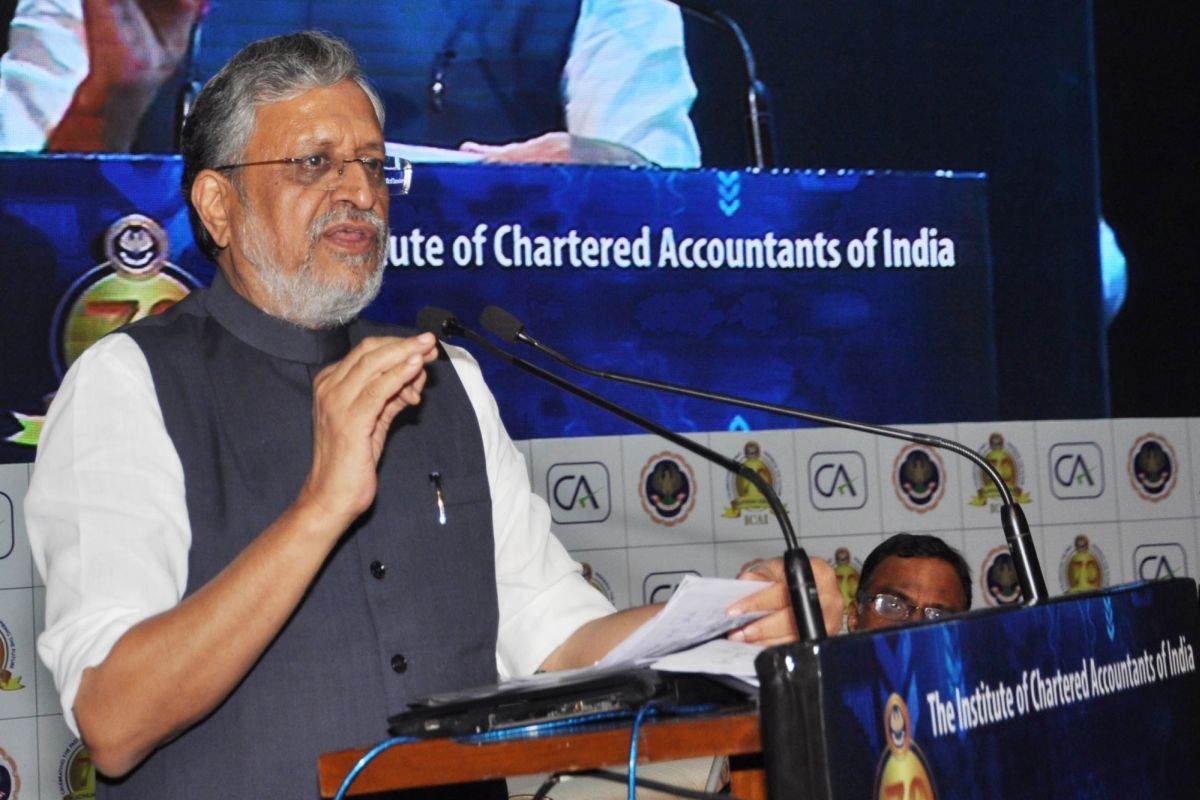Modi hopes to break 2014 and 2019 records under Yogi’s leadership
The prime minister hoped of an unexpected victory for the BJP in the 2024 Lok Sabha elections attributing it to CM Yogi's commitment to good governance and development.
The deadline for implementation of the new system for small taxpayers is January 1, 2020, whereas, for big taxpayers above Rs. 5 crores, it is October 1, 2019, he said, adding the prototype of the filing system will be made available Monday.

(Photo: IANS)
The new Goods and Services Tax return filing system will enable traders to file returns in a single format once a month instead of multiple formats, Bihar deputy chief minister Sushil Modi, who heads the Group of Ministers (GoM) to look into revenue shortfall after the GST roll-out said on Saturday.
Dubbing the new system as “GST-2”, Sushil Modi said the GST council has decided that the new filing system would be launched from October 1 this year.
The deadline for implementation of the new system for small taxpayers is January 1, 2020, whereas, for big taxpayers above Rs. 5 crores,it is October 1, 2019, he said, adding the prototype of the filing system will be made available Monday.
Advertisement
New forms – Sahaj and Sugam – have been developed for a different class of traders, Sushil Modi told reporters in Bengaluru.
He said the GST implementation would complete two years on July 1 and the emphasis would be on more simplification of the process, compliance and how to check tax evasion.
Elaborating on GST-2, Sushil Modi said when GST was designed, there were three return formats and one had to file 36 returns per month. Then there was another return and audit report too, he said.
The new return does away with all the hassles as one has to file returns only once in a month, according to him.
“For big taxpayers, it is 12 returns a year and for small taxpayers, it is only four returns a year,” he said.
The meeting in Bengaluru on Saturday pertained to information technology initiatives in the GST.
The panel wanted to check with Infosys the status of the implementation of the new tax because the GST council has assigned the infotech giant to design everything related to the GST new return system, Sushil Modi said.
“They (firms) will get a refund from one source and complete online refund is likely to be implemented by September 2019. This is the deadline we have fixed,” he said.
On checking tax evasion, Sushil Modi said new features have been introduced in the e-way bill to check tax evasion.
The e-way bills will be auto-operated checking “pin-to-pin” distance and this will ensure that no duplicate bill can be generated.
E-Invoice is another major step which will check tax evasion and filing returns will not be necessary as data will be captured in the system.
“Through E-Invoicing, the e-way bill will be generated and return will be filed automatically. It will be a major tool to check tax evasion,” Sushil Modi said.
Another major step, he said, was giving the Radio-frequency identification (RFID) tag to motor vehicles to capture data by sensors at a definite place.
It will automatically inform the authorities whether the e-way bill of the vehicle has been generated or not.
The RFID tag has been implemented in three states including Maharashtra and Uttar Pradesh and the result was encouraging in preventing tax evasion.
The GST council is contemplating putting up such sensors at 450 toll plazas and make RFID tag mandatory for all vehicles.
The National Highway Authority of India will have to operate these sensors, Sushil Modi said.
On fake bills, he said the computerised GST system recently unearthed large-scale fraudulent input tax credit across the country.
Firms, which do not exist, were claiming input tax credit through fake bills, he pointed out.
The Bihar deputy chief minister said tax collection under GST in 2017-18 was Rs. 7.4 lakh crore, which was of nine months whereas in 2018-19, when we had 12 months, the total revenue collected was Rs. 11.77 lakh crore.
“It’s only two years of GST and I can tell you that the revenue collection is very encouraging,” Sushil Modi said.
GST, which subsumed 17 local levies, was rolled out on the intervening night of June 30 and July 1, 2017, in a ceremony held in the central hall of the parliament.
The GST Council, headed by then Finance Minister Arun Jaitley and comprising state ministers, had on December 22, 2018, decided to set up a GoM to analyse reasons for shortfall in revenue collections by the states since July 2017.
Advertisement